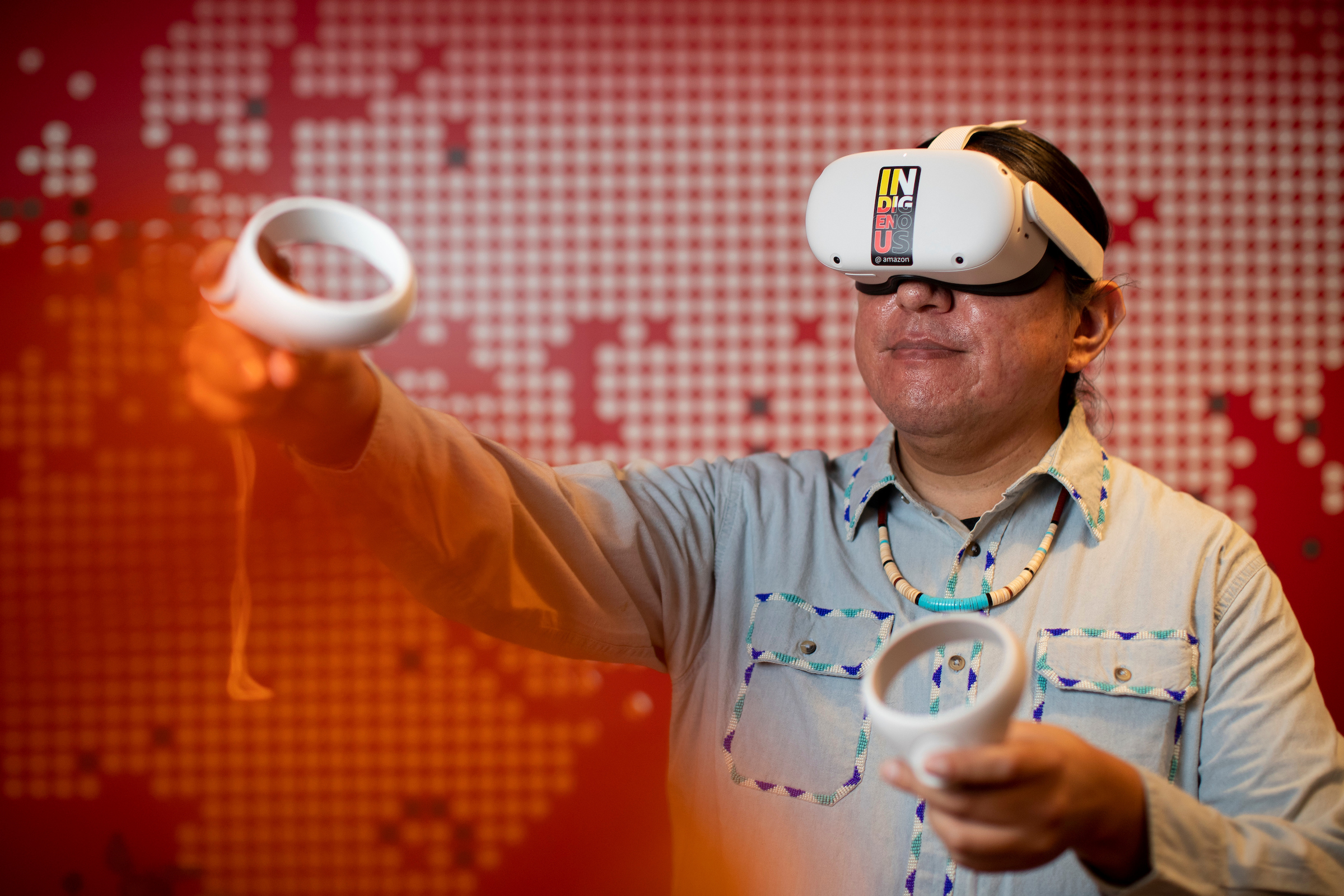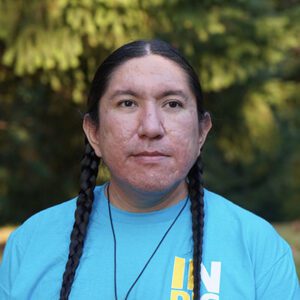From Atari Games to AR/VR, Michael Running Wolf is Revitalizing Indigenous Languages

This post originally appeared at Khoury College of Computer Sciences news.
By Aditi Peyush
Michael Running Wolf never met a stranger until he was 18 years old.
He grew up in a small rural village in Montana, “Almost everyone in the village was family from my mother’s side, so I grew up with my cousins and aunts and uncles and brothers and sisters,” he said.
Running Wolf – a new clinical instructor of computer science at Khoury College’s Vancouver campus – explained that his village wasn’t high tech, “We didn’t have reliable electricity, or even water, and we had an outhouse.” But growing up in Montana, his upbringing consisted of running around outside in the woods, fishing in rivers nearby, and riding horses in Birney, a Cheyenne village.
His early interest in technology was sparked by one of the original home video game platforms. “My sisters had bought an Atari, you know, the old Atari, […] and when the electricity was working, we’d plug the Atari into our black and white TV,” he said. While America was going online in the 90s, Running Wolf’s fascination turned back in time, to a technological relic.
Running Wolf’s personal experience with technology wasn’t the only factor shaping his interests. His mother was an engineer who once worked for Hewlett Packard, and his father was a traditional Lakota artist with a degree in fine arts. While his mother showed him math and how to use her slide rule, his father taught him how to paint, draw, and hunt. Comfortable in both fields, Running Wolf almost followed his father’s artistic influence down another path: “I didn’t know I wanted to be a computer scientist – I thought I was gonna be a poet, but my English writing professor accidentally convinced me not to be a writer.” While he chose computer science as his profession, Running Wolf is still a published poet.
During his undergraduate career at Montana State University in Bozeman, Running Wolf interned at IBM, an experience he describes as “pivotal” because it inspired him to expand his horizons. “In Montana, I grew up in a small village, I had never met more than 100 people, then I was in classes with 200 people, and suddenly going to IBM in San Jose,” he said.
Adding that the educational experience is limited by what’s taught in classes, Running Wolf said, “At IBM, I was so inspired by the different possibilities – quantum computing, databases, and artificial intelligence – it opened my eyes to what was going on outside of my university.” Determined to gain even more experience, Running Wolf interned at Lawrence Livermore National Laboratory, where he created a database-driven web-based tool to manage classified imagery. “They were the ones that inspired me to get a master’s degree,” he said.
Work on automatic speech recognition and indigenous languages
As he developed his career in industry as a software engineer, he used his technical know-how to sustain vital aspects of indigenous culture and language. About this focus Running Wolf explained, “The goal was kind of, how do we use advanced technology to not only preserve – because preserve is anthropological, like putting things in a museum – but actually revitalize and reclaim our knowledge systems with modern technology?” The move away from preservation is a key part of Running Wolf’s vision. He elaborated, “You have Native American or First Nation or other ‘exotic’ artifacts, right next to dinosaur bones – that’s preservation, I’m not interested in preservation.”
As Running Wolf was starting out with a goal to build a database of cultural languages using augmented reality and virtual reality (AR/VR), he quickly realized he didn’t know how to scale the database for multiple tribes. He tried something else – examining the role of cultural artifacts. “There are a lot of cultural artifacts that were stolen from tribes, so my wife and I started scanning them using photogrammetry and using them in our augmented and virtual realities,” he said. The couple learned the stories behind the artifacts, which inspired a new direction.
Wanting to connect spoken-word stories to the artifacts, Running Wolf explored voice AI technologies and discovered there was little to no research on Indigenous automatic speech recognition (ASR). Then, Running Wolf met researchers who successfully used it for the Māori tribe – with only 300 hours of annotated audio. “It’s amazing, it’s so infinitesimally small compared to what they’re doing for Google, Siri, and Alexa, which usually take millions of hours of audio to ensure reliability,” he said. Running Wolf began diving into artificial intelligence (AI).
Since 2019, he’s been working with other data scientists in Canada and the US, specifically researchers at the Computer Research Institute of Montreal (CRIM), members of the Seneca Nation, and more recently, MIT, to solve the issue of how to make automatic speech recognition for indigenous languages. This issue yields a number of additional challenges, one of them being low data. For example, Running Wolf’s tribe, the Cheyenne, has around 500 fluent speakers out of a total population of 10,000. Another tribe, the Makah, only has 16 speakers. Some of the work on the project, therefore, is outreach to tribes. “I believe that technology is going to be a way that we reclaim our language, and more than just preserve it,” said Running Wolf, emphasizing, “I’m really interested in building systems that empower people to create user interaction with machines for the language.”
Experiences at Amazon with the Alexa pipeline
Alongside his self-developed projects using technology to revitalize and strengthen indigenous languages, Running Wolf has been working as a software development engineer at Amazon for four years. Starting out in the company, he said, “I actually worked in the privacy world at Amazon, and I got intimately familiar with how the Alexa pipeline worked.”
His Amazon experiences have enabled Running Wolf to understand how knowledge systems and security systems worked, and he realized they’re also critical for tribes. “You have a variety of different users, you might have a bucket of data, but you have different access restrictions – how do you manage that and also scale it?” he said. Working at Amazon, a company dealing with petabytes of data, Running Wolf was able to understand how problems really scale, especially in the database and AI space.
As he joins Khoury College’s Vancouver campus as a clinical instructor, transitioning from industry into the classroom, Running Wolf plans to translate his experiences at Amazon into his teaching. “There are a lot of good things that came out of working at Amazon, the ethics and the awareness of what’s really important, and that’s what I want to bring to the students,” he said. His expertise in discerning between important and irrelevant factors when building a computer system is another strength, Running Wolf pointed out, saying, “This has made me a very pragmatic software engineer and given me the ability to identify and problem-solve very quickly and practically.”
Eager to bring the practical awareness of working with large-scale systems to his students, Running Wolf emphasized that experimentation and failure are critical life experiences, “You’re a student, you’re not gonna get fired.” His goal is to provide students with the skillset that gives them a competitive advantage as Northeastern graduates in the corporate marketplace.




